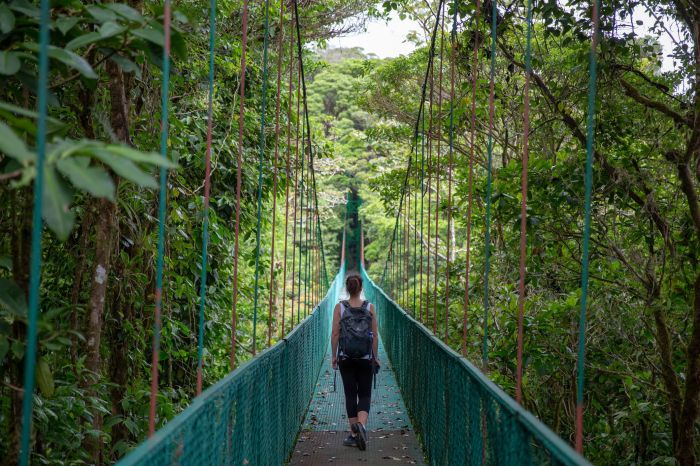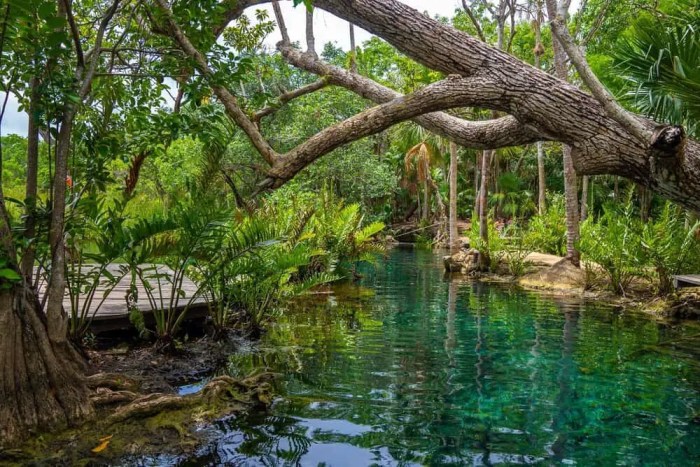Sustainable travel destinations are gaining popularity as travelers become more conscious of their environmental impact. These destinations offer a unique blend of natural beauty, cultural heritage, and responsible tourism practices, providing an unforgettable travel experience while minimizing harm to the planet.
From pristine beaches to lush rainforests and ancient cities, sustainable travel destinations offer a diverse range of experiences that cater to every traveler’s interests. Whether you’re seeking adventure, relaxation, or cultural immersion, there’s a sustainable destination waiting to be explored.
Sustainable Travel Practices
Sustainable travel aims to minimize the negative impact on the environment and local communities while maximizing positive contributions. It involves responsible tourism practices that preserve natural resources, respect cultural heritage, and promote economic development in a sustainable manner.
Travelers can minimize their environmental impact by choosing sustainable transportation options, such as public transportation, cycling, or walking. They can also reduce their carbon footprint by opting for energy-efficient accommodations and minimizing waste through reusable items and responsible consumption.
Responsible Tourism and Ethical Practices
Responsible tourism involves respecting local customs, traditions, and beliefs. Travelers should be mindful of their behavior and interactions with local communities, ensuring they do not disrupt or harm their way of life. Ethical practices include supporting local businesses, protecting wildlife, and minimizing noise and light pollution.
Exploring sustainable travel destinations is an excellent way to teach children about environmental responsibility while creating lasting memories. For families on a budget, consider exploring destinations that offer affordable activities, such as hiking, biking, and camping. You can also find budget family vacations that include educational programs and immersive cultural experiences.
These trips provide opportunities for families to bond, learn, and create cherished memories while promoting sustainable tourism.
Eco-Friendly Destinations

As the global travel industry embraces sustainable practices, various destinations worldwide have emerged as leaders in environmental conservation and responsible tourism.
Sustainable travel destinations are becoming increasingly popular as travelers seek out ways to reduce their environmental impact. These destinations offer a wide range of activities and attractions that are designed to minimize harm to the environment, while still providing a luxurious and enjoyable experience.
For those looking for the ultimate in luxury, there are a number of luxury travel deals available that can help you plan your dream vacation. These deals often include exclusive access to private beaches, gourmet dining, and other amenities that will make your trip truly unforgettable.
So whether you’re looking for a sustainable travel destination or a luxurious getaway, there’s sure to be something to fit your needs.
These destinations offer travelers unique opportunities to immerse themselves in pristine natural environments, support local communities, and contribute to the preservation of our planet’s ecosystems.
Popular Sustainable Travel Destinations
Some of the most popular sustainable travel destinations include:
- Costa Rica: Known for its rainforests, biodiversity, and ecotourism initiatives.
- New Zealand: Renowned for its stunning landscapes, adventure activities, and commitment to conservation.
- Iceland: Home to glaciers, volcanoes, and a thriving geothermal industry.
- Norway: Boasts fjords, mountains, and a focus on sustainable fishing practices.
- Bhutan: A Himalayan kingdom that prioritizes Gross National Happiness and environmental protection.
Conservation and Restoration Efforts: Sustainable Travel Destinations

Sustainable travel destinations prioritize the preservation and restoration of natural habitats and ecosystems. Conservation projects aim to protect endangered species, restore degraded environments, and promote sustainable land management practices.
Local communities play a crucial role in conservation efforts. They possess valuable knowledge about the local environment and can contribute to the design and implementation of conservation initiatives. By involving local communities, sustainable travel destinations ensure that conservation efforts are culturally sensitive and benefit both wildlife and local ecosystems.
Successful Conservation Initiatives
- Reforestation Projects: Planting native trees and restoring degraded forests help mitigate climate change, provide habitat for wildlife, and improve water quality.
- Marine Conservation Areas: Establishing protected areas in coastal and marine environments safeguards marine ecosystems, supports biodiversity, and promotes sustainable fishing practices.
- Wildlife Rehabilitation Programs: Rescuing, rehabilitating, and releasing injured or orphaned wildlife helps maintain healthy populations and contributes to the recovery of endangered species.
Cultural Heritage and Local Economies

Sustainable travel plays a crucial role in preserving cultural heritage by fostering appreciation and understanding among visitors. When tourists engage with local communities, they learn about traditional practices, customs, and art forms, contributing to the preservation and transmission of cultural knowledge. Moreover, sustainable tourism practices aim to minimize negative impacts on heritage sites, ensuring their integrity for future generations.
Benefits for Local Economies
Tourism in sustainable destinations can significantly benefit local economies. Revenue generated from tourism can be invested in community development projects, such as infrastructure improvements, education, and healthcare. This investment enhances the quality of life for residents and creates employment opportunities. Additionally, sustainable tourism promotes the sale of local products and services, supporting small businesses and entrepreneurs.
Examples of Tourism Revenue Investment
* In the Galapagos Islands, tourism revenue has been used to establish a sustainable waste management system, protecting the fragile ecosystem.
* In Bhutan, a portion of tourism revenue is allocated to the Bhutan Trust Fund, which supports education, healthcare, and environmental conservation initiatives.
* In Costa Rica, tourism revenue has been invested in the development of national parks and protected areas, preserving biodiversity and promoting ecotourism.
Climate Change and Environmental Impacts

Climate change poses significant challenges to travel destinations worldwide. Rising sea levels, extreme weather events, and changes in biodiversity threaten coastal areas, natural attractions, and the livelihoods of local communities dependent on tourism.
Sustainable travel destinations are becoming increasingly popular as travelers seek to minimize their environmental impact. From eco-friendly accommodations to responsible tour operators, there are many ways to travel sustainably. If you’re looking for a more luxurious travel experience, check out these luxury travel tips.
You can still enjoy the finer things in life while traveling responsibly. And by choosing sustainable travel destinations, you can help to protect the environment for future generations.
Sustainable travel practices can play a crucial role in mitigating the carbon emissions associated with tourism. By adopting renewable energy sources, promoting sustainable transportation, and reducing waste, travelers can minimize their environmental impact.
Renewable Energy and Sustainable Transportation
- Investing in solar, wind, and geothermal energy can reduce the reliance on fossil fuels, lowering greenhouse gas emissions.
- Promoting electric vehicles, public transportation, and walking/cycling can decrease air pollution and carbon emissions from transportation.
Certifications and Standards
Certifications and standards are essential for ensuring the credibility and legitimacy of sustainable travel practices. They provide a framework for businesses and destinations to demonstrate their commitment to environmental conservation, social responsibility, and economic sustainability.
Reputable organizations such as the Global Sustainable Tourism Council (GSTC), Green Globe, and EarthCheck certify travel businesses and destinations based on rigorous criteria covering various aspects of sustainability, including environmental management, social and cultural impact, and economic benefits.
Benefits of Choosing Certified Operators, Sustainable travel destinations
- Guaranteed Sustainability: Certified operators adhere to internationally recognized standards, ensuring their practices meet the highest levels of sustainability.
- Credibility and Transparency: Certifications provide independent verification of a business’s sustainability claims, enhancing their credibility and transparency.
- Positive Impact: By supporting certified operators, travelers contribute to the protection of the environment, the well-being of local communities, and the preservation of cultural heritage.
Future Trends and Innovations
The future of sustainable travel holds exciting prospects, driven by technological advancements and innovative practices. As the industry adapts to evolving consumer preferences and environmental concerns, numerous trends and innovations are emerging.
Technology for Responsible Tourism
Technology plays a pivotal role in promoting responsible tourism. Mobile applications and online platforms empower travelers to make informed choices, providing real-time information on sustainable destinations, eco-friendly accommodations, and local experiences. Virtual reality and augmented reality technologies offer immersive experiences that showcase natural and cultural heritage without causing physical impact.
Artificial Intelligence and Data Analytics
Artificial intelligence (AI) and data analytics are transforming the sustainable travel landscape. AI-powered chatbots assist travelers in planning eco-conscious itineraries, recommending destinations based on their preferences and environmental impact. Data analytics provides valuable insights into traveler behavior, enabling destinations to optimize sustainability initiatives and tailor experiences to meet evolving demands.
Ultimate Conclusion

Embracing sustainable travel practices not only benefits the environment but also enriches the travel experience. By choosing eco-friendly destinations and operators, travelers can make a positive impact on local communities, preserve cultural heritage, and protect the planet for future generations.
As the world becomes increasingly aware of the importance of sustainability, the demand for sustainable travel destinations will continue to grow. By embracing this trend, travelers can create a more sustainable and fulfilling travel experience while contributing to a better future for our planet.
FAQ Explained
What are the key principles of sustainable travel?
Sustainable travel aims to minimize environmental impact, support local economies, and preserve cultural heritage. Key principles include choosing eco-friendly transportation, staying in sustainable accommodations, and engaging in responsible activities.
How can travelers reduce their environmental impact?
Travelers can reduce their environmental impact by choosing low-carbon transportation options, reducing waste, conserving energy and water, and supporting local businesses that prioritize sustainability.
What are the benefits of sustainable travel for local communities?
Sustainable travel can create jobs, support local businesses, and preserve cultural heritage. It also helps to protect the environment and natural resources that are vital to local communities.